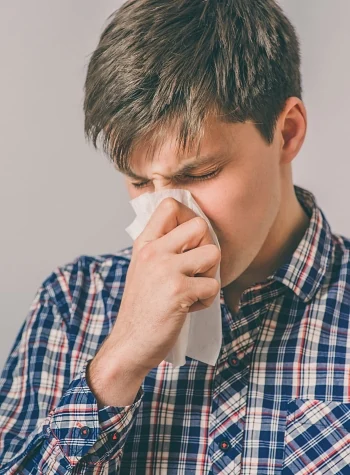Dr. Shawn Allen has either authored or reviewed and approved this content.
Page Updated:Nasal polyps can cause persistent congestion, difficulty breathing, and a diminished sense of smell, impacting your daily life. As a fellowship-trained rhinologist and ENT specialist, Dr. Shawn Allen provides advanced, patient-centered care to effectively diagnose and treat nasal polyps, helping you breathe easier and feel better.

Nasal polyps are soft, noncancerous growths that develop in the lining of your nasal passages or sinuses. They are typically shaped like teardrops or grapes and can vary in size from a few millimeters to several centimeters.
While nasal polyps are benign, or noncancerous, these growths can become bothersome, obstructing airflow and contributing to chronic sinus infections. Left untreated, nasal polyps may lead to worsening congestion, sinus pressure, and breathing difficulties.

Recognizing nasal polyps early can help you seek timely treatment. Common symptoms include:
If you experience these symptoms, an evaluation with Dr. Allen can provide clarity and solutions.
Concerned about your sinus symptoms?
Schedule a consultation with Dr. Allen
Nasal polyps develop due to chronic inflammation of the nasal and sinus tissues. Common conditions that increase your risk include:
While nasal polyps can be persistent, expert treatment can help control symptoms and prevent recurrence.
Accurate diagnosis is key to effective treatment. Dr. Allen’s comprehensive evaluation typically includes:
This thorough approach ensures your treatment is tailored for the best possible outcome.
Effective treatment for nasal polyps often requires a combination of surgery and medication to control inflammation and prevent recurrence. While medications can help reduce symptoms and polyp size, surgery is often necessary to restore proper sinus function and allow for long-term management with topical treatments.
Endoscopic sinus surgery is the most effective treatment option for patients whose nasal polyps do not respond adequately to medication. Dr. Allen specializes in this minimally invasive procedure, which involves using a small endoscope with a camera to visualize the sinuses and carefully remove the polyps. This procedure is performed under general anesthesia for optimal precision and patient comfort.
In some cases, patients who have previously undergone endoscopic sinus surgery may be candidates for in-office polyp removal under local anesthesia. This approach provides a convenient and effective option for managing recurrent polyps.
Following surgery, ongoing medical management is crucial to prevent polyp regrowth and maintain clear nasal passages.
To reduce inflammation and support long-term polyp control, Dr. Allen may recommend:
Regular follow-up visits are essential for long-term polyp management. After successful treatment, most patients only require check-ups once or twice per year or as needed when symptoms arise. Monitoring is critical, as uncontrolled inflammation over time may require stronger treatments, such as oral steroids, which carry a higher risk of side effects than topical therapies.
By combining expert surgical intervention with personalized long-term care, Dr. Allen helps patients achieve lasting relief and improved sinus health.
Dr. Allen is committed to helping patients find long-term relief from nasal polyps and sinus issues through expert, compassionate care. Choosing Dr. Allen for sinus care means you get:

Relief from nasal polyps is possible. Take the first step toward better breathing and improved sinus health. Schedule a consultation today.
Dr. Shawn Allen has either authored or reviewed and approved this content.
Page Updated: